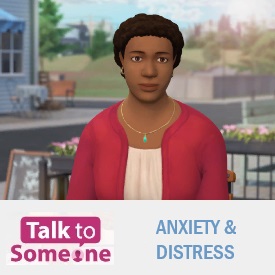What to know
Distress screening is recommended for cancer patients in all clinical settings.

Background
As many as three out of every four people with cancer experience symptoms of psychological distress or cognitive concerns. These issues can negatively affect cancer patients' overall well-being and health outcomes. Distress screening is recommended for cancer patients in all clinical settings, and is required in American College of Surgeons Commission on Cancer (AcoS)-accredited facilities. Unfortunately, one-third or fewer cancer patients have talked to their doctor about their psychosocial needs and concerns, and fewer receive treatment for distress.
Training simulation
The Provider Education for Mental Health Care of Cancer Survivors Training was created to support health care providers, improve knowledge about cancer patients' mental health care, and promote recommended distress screening. Read the course summary.
During this free, web-based interactive training, providers can engage in role-play conversations with simulated cancer survivors to try different approaches to discussing mental health concerns identified through distress screening, and make appropriate referrals when indicated. This training also allows providers to get personalized feedback and gain the confidence and skills to lead similar conversations in real life. During the training, providers can complete learning tasks related to distress screening, patient-reported stressors, patient concerns, and referral options.
Provider Education for Mental Health Care of Cancer Survivors
This project was funded by the Centers for Disease Control and Prevention (CDC's Office of State, Tribal, Local, and Territorial Support) through cooperative agreement number 5NU38OT000225-05 with the National Association of Chronic Disease Directors.
Simulation for cancer patients and survivors

Talk to Someone: Anxiety and Distress talks about common stresses and concerns for people with cancer, and how to find support.
Videos
Amelia: “Chemo Brain”
Amelia Ballard, a childhood cancer survivor, talks to clinical health psychologist Dr. Lynne Padgett about problems with learning, concentration, and memory during and after cancer treatment in this video.
Amelia: Coordinating Care
In this video, oncologist Dr. Tonya Echols Cole speaks with pediatric cancer survivor Amelia Ballard about the importance of her medical team's coordinated follow-up care.
James
Reverend Dr. James Brewer-Calvert talks to clinical health psychologist Dr. Lynne Padgett about sharing what he was feeling and thinking with his doctors during colon cancer treatment in this video.
Mari
Oncologist Dr. Tonya Echols Cole talks to Mari Brick about what it was like for her to adjust to life after breast cancer treatment in this video.
Brock
In this video, multiple myeloma survivor Brock Lamont shares his experience with talking about mental health issues with his health care providers with Dr. Lynne Padgett, a clinical health psychologist.
Psychosocial Distress Screening
In this video, learn about tools that health care providers can use to conduct distress screening with patients during and after cancer treatment.
